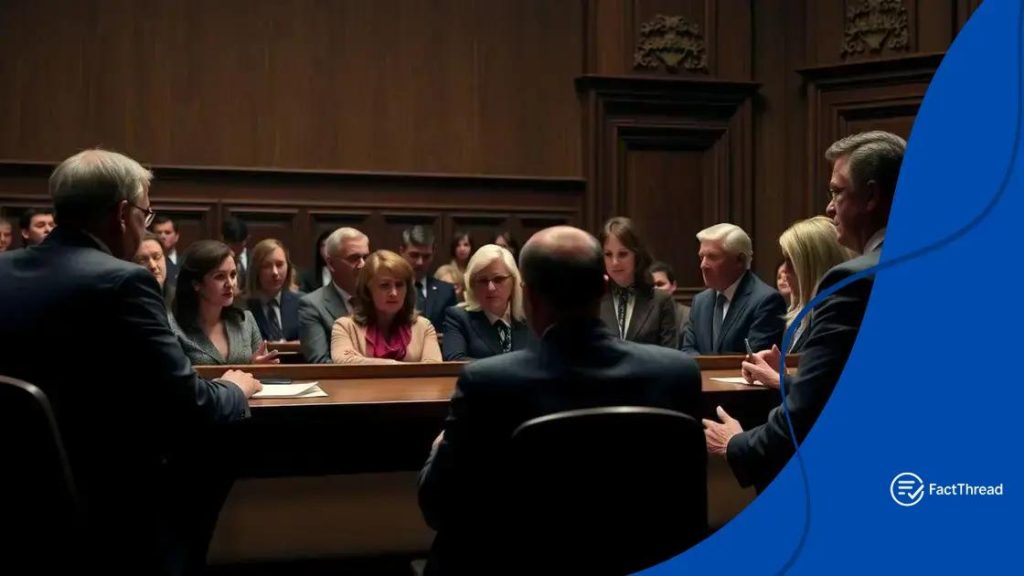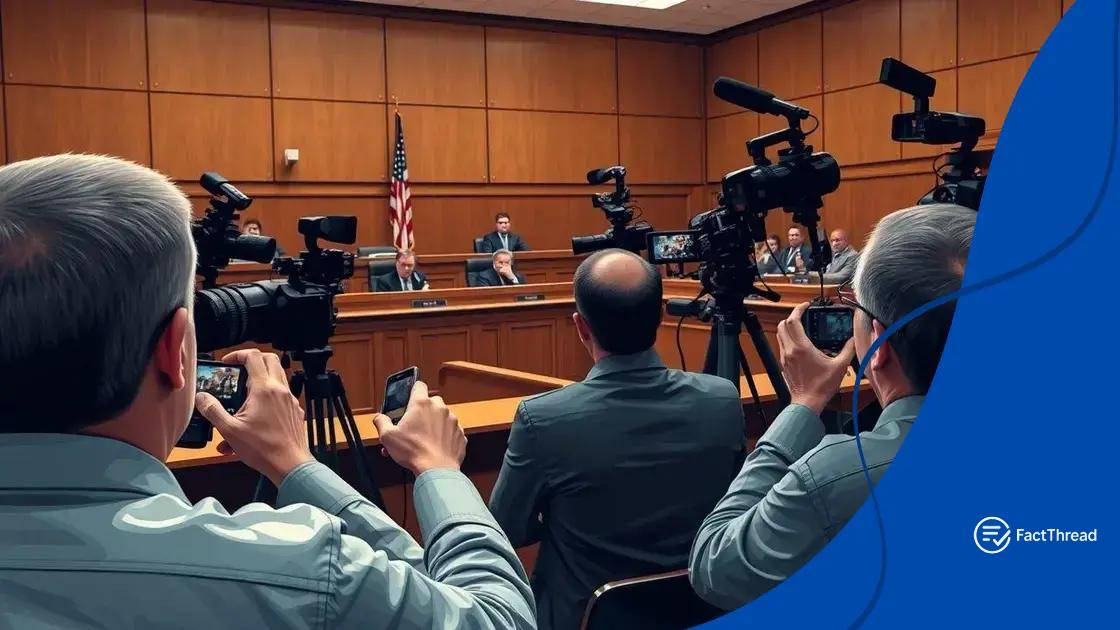Verdicts reached in high-profile criminal trials

Verdicts reached in high-profile criminal trials significantly influence public opinion, guide legal reforms, and reflect societal values, often reshaping the landscape of justice and the rule of law.
Verdicts reached in high-profile criminal trials often capture our collective attention, sparking debates and discussions. Have you ever wondered how these legal outcomes affect society’s views on justice? Let’s dive into the intricacies of these influential cases.
The significance of high-profile criminal trials
The significance of high-profile criminal trials extends beyond the courtroom. These trials often capture national attention and influence public perception of justice. People from all walks of life are drawn into these cases, eager to understand the implications of the verdicts. They raise questions about the legal system, the media’s role, and the very fabric of society.
Impact on Society
High-profile trials can shape societal views in profound ways. For instance, individuals may reassess their stance on issues such as race, class, and justice based on trial outcomes. When a controversial verdict is announced, it can lead to public outcry, protests, or even movements that seek to address perceived injustices.
Media Coverage and Its Influence
The media plays a pivotal role in shaping the narrative surrounding high-profile trials. The stories they tell can sway public opinion and impact the perspectives of those outside the courtroom.
- Selective reporting can lead to biased perceptions.
- News networks often provide continuous coverage, keeping the public engaged.
- Social media allows for instant reactions and discussions, amplifying voices.
- Documentaries and podcasts offer deep dives into cases, educating audiences further.
Furthermore, media representation can affect how victims and defendants are viewed. The portrayal of defendants as guilty before a trial begins might influence jurors’unconscious biases.
Additionally, these cases often serve as a backdrop for broader societal conversations, pushing forward issues like accountability, transparency in the legal system, and ongoing debates about the death penalty. As such, high-profile trials become part of the cultural landscape, influencing everything from legislation to public awareness campaigns.
As we continue to witness high-profile criminal trials, understanding their significance helps us grapple with the complexities of justice. Each case adds a chapter to the ongoing story of law and order in our society.
Major cases that shaped public opinion
Throughout history, several major cases that shaped public opinion have brought attention to critical issues within the justice system. These trials often serve as turning points in societal conversations around law, ethics, and morality. As people follow these cases, their perceptions can shift dramatically based on the evidence presented, the media coverage, and the verdicts reached.
Key Cases That Influenced Society
Some trials have not only determined the fate of individuals but also sparked widespread movements and changes in laws. For example, the trials surrounding O.J. Simpson drew national interest and raised questions about race and celebrity in the justice system. This case exposed deep divides in public sentiment and conversation surrounding race relations in the United States.
The Role of the Media
The media plays a vital role in shaping public opinion during these high-profile trials. The portrayal of evidence, witness testimonies, and emotional stories can alter how people feel about the events. Public interest sometimes leads to sensationalism, which can skew facts and create biases.
- Media coverage can magnify certain aspects while neglecting others.
- Social media allows rapid sharing of opinions and reactions.
- Documentaries can provide in-depth analysis, further influencing public perception.
- Highly publicized cases often become cultural references that influence future legal discussions.
In addition to raising questions about fairness in trials, these cases frequently prompt individuals to engage in discussions about justice reform. Cases like the Rodney King trial not only led to protests but also resulted in changes in policing policies and practices across the nation, illustrating the profound impact trials can have on public life.
Moreover, high-profile cases often challenge existing laws or push for new regulations. For instance, the significant media coverage of the Me Too movement following various trials brought attention to issues of sexual harassment and assault, leading to changes in workplace policies and culture.
How media coverage influences verdicts

The way the media covers trials can significantly influence verdicts in high-profile cases. This influence often begins before a trial even starts, shaping public perceptions of guilt or innocence. With constant news coverage, the narratives built by journalists can sway public opinion and ultimately affect the decisions made in court.
The Power of Public Opinion
Public opinion can be a double-edged sword during a trial. If the media presents a case in a certain light, it may mold the beliefs of the jurors, even if they are instructed to remain impartial. A strong media narrative can lead people to form biases that cloud their judgment.
Examples of Media Influence
There are several notable cases where media coverage played a significant role in how the trial unfolded:
- The O.J. Simpson trial, where relentless media coverage raised public emotions and led to heated debates on race and celebrity.
- In the Casey Anthony trial, the media’s portrayal of her as guilty influenced public sentiment before the verdict was even announced.
- Coverage of the George Zimmerman trial not only sparked national protests but also ignited discussions about race relations in America.
Additionally, the headlines and frames of stories often create a backdrop that follows the trial, affecting how jurors perceive the evidence presented. For instance, graphic coverage of a crime can taint the perspectives of those involved, leading to harsher judgments.
Moreover, social media plays a growing role in shaping public opinion. Tweets, posts, and comments can amplify narratives much faster than traditional news. This instant commentary allows for real-time discussions that can further entrench feelings about a case.
As a result, the media’s focus can lead to heightened emotions and biases both in the courtroom and among the public, making it essential for many to critically evaluate the stories being told. In the end, understanding how media influences verdicts is crucial for anyone following high-profile trials, as the sway of public perception can alter the course of justice.
The role of public sentiment in legal decisions
The role of public sentiment in legal decisions is often underestimated. Public opinion has the power to shape the outcomes of high-profile trials and influence the actions of lawmakers. When a case garners significant media attention, the feelings and reactions of the public can weigh heavily on jurors and judges alike.
The Influence of Emotions
Emotional responses from the public can create a sense of urgency for justice. For example, cases involving serious crimes often provoke strong feelings, pushing communities to demand accountability. This pressure can sometimes result in harsher sentences or even rushed legal processes, as public outcry intensifies.
Pressure on Legal Outcomes
High-profile trials like the Chauvin trial for the murder of George Floyd exemplify how public sentiment can impact legal outcomes. Protests and demonstrations took hold across the nation, calling for justice and reform. The overwhelming public response not only affected the trial itself but also sparked changes within law enforcement policies nationwide.
- Public demonstrations can influence jury decisions by creating a charged atmosphere.
- Social media platforms amplify public sentiment, shaping narratives and discussions.
- Legislators are often swayed by public opinion, leading to new laws or reforms.
As trials unfold, jurors may be reminded of the public sentiment surrounding their decisions. The responsibility to remain impartial becomes illuminated under the spotlight of societal pressures. Some jurors may even struggle to maintain objectivity when they perceive a strong public urgency for a particular verdict.
This intersection of law and public opinion underscores the need for a balanced approach in the legal system. However, it also raises questions about the fairness and integrity of trials. To navigate this complex landscape, legal professionals must be aware of the effects that public sentiment can have on their work.
In many cases, the lingering effects of public sentiment can lead to long-lasting changes within the justice system. These changes may impact policies, create new laws, or provoke societal dialogues that continue long after the trial has ended.
Lessons learned from landmark verdicts
Many landmark verdicts in high-profile criminal trials have left lasting impacts on society and the legal system. These cases serve as important lessons on justice, public opinion, and the rule of law. Each verdict not only resolves a specific case but also shapes the way future cases are approached and understood.
Case Studies of Landmark Verdicts
For instance, the Brown v. Board of Education case taught us about the importance of equality in education. This verdict paved the way for desegregation and highlighted systemic racism within legal systems. The transformative decisions made in such cases often encourage societal changes that extend beyond the courtroom.
The Ripple Effects
Other landmark cases, like Miranda v. Arizona, remind us of the essential rights of individuals under police custody. This verdict led to the establishment of the Miranda warning, ensuring that individuals understand their rights when facing charges. These changes demonstrate how verdicts can reshape legal processes and principles.
- Legal standards can evolve in response to public sentiment reflected in landmark verdicts.
- High-profile cases often ignite discussions on broader social issues, influencing future legislation.
- Jurors and legal professionals may reference these cases as examples in future trials.
Additionally, public reactions to these cases can trigger movements and reforms that alter the landscape of justice. The verdicts often encourage people to advocate for change, leading to new laws that reflect evolving societal values.
Furthermore, the lessons learned from these landmark verdicts can inform training for law enforcement and legal practitioners. Understanding past mistakes helps prevent future injustices and ensures a fairer application of the law.
In summary, each verdict teaches critical lessons that resonate throughout society, reminding us of the importance of justice and the rule of law. As society evolves, reflecting on these cases allows us to learn from history and strive for a more equitable future.
FAQ – Frequently Asked Questions about High-Profile Criminal Trials
What is the impact of high-profile criminal trials on public opinion?
High-profile trials can significantly shape public opinion, influencing perceptions of justice and prompting discussions on societal issues.
How does media coverage influence legal decisions?
Media coverage can create a narrative that affects jurors’ perceptions and can pressure legal professionals, influencing verdicts.
What lessons can we learn from landmark verdicts?
Landmark verdicts highlight issues of justice, equality, and legal standards, teaching society lessons that can lead to reforms.
How does public sentiment affect the outcome of trials?
Public sentiment can pressure jurors and judges, leading to decisions that may reflect societal demands rather than solely the facts presented.